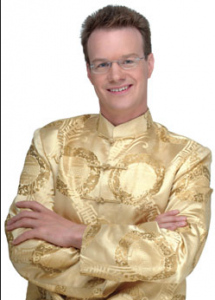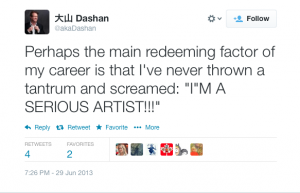In praise of…The Mandarin bum
Posted: 04/16/2014 11:00 amThere is Phil from the United States who has the very Chinese affliction of clinking glasses with you every time he takes a sip of booze, which is alarmingly frequent. There is Barry from South Africa who is a black belt in several martial arts and has his hair done up in a Qing Dynasty-style queue. There is also Sam from Canada who came to China in 1999 and for most of the next 14 years would work in Shenzhen without the right visa.
These men have two things in common. They speak fluent Mandarin and they are not professionals. They are examples of what is known in some circles as “The Mandarin bum”. They have spent the bulk of their working lives in the notoriously unstable position of teaching English in China. They are the antithesis of those on corporate packages who live in an “expat bubble”.
Do these English teachers warrant the label of “loser” that is often attached to expats who fail to carve out a professional career? Well, the “loser” is a concept that is particular to modern urban culture in which the value of a person is measured not by what they bring to the local community, but by the amount of wealth and status they acquire. By this measure, the migrant workers on whose labour China’s economic miracle has been built are also losers.
More important than usefulness
Novelist Alan Garner said in his book of lectures and essays “The Voice That Thunders” that nowadays we learn languages for the wrong reasons. We learn German not to see into the heart of Goethe, but to book a hotel room in Berlin.
Poet Matthew Arnold, who was the son of a headmaster of the famous Rugby School, said education should be about studying the best things that have ever been written and said. He lived in Britain during a time when elite education revolved around Latin and Ancient Greek. This also happens to be the time when Britain ruled the world, but that’s beside the point.
There are plenty of reasons why learning Mandarin makes you a smarter and more interesting person. Reading Chinese aloud activates far more widespread networks of the right hemisphere of the brain than English, probably because of the subtlety of both visual and tonal demands by Chinese, according to Ian McGilchrist’s “The Master and His Emissary: The Divided Brain and the Making of the Western World.”
The pictorial writing system means the language wears its etymology on its sleeve in a way European languages don’t. For example, the character for man – “男” is a picture of an east-Asian field on top of a sickle, which is a symbol of strength. This most likely symbolizes the belief that the societal role of men is to offer strength in the field. The character for woman – “女” appears to be a picture of a demure woman curtsying or crossing her legs. The language is misogynistic as hell, but at least it lets you know.
Moreover, mastery of this language gives learners access to one of the world’s great cultures. It is the culture of the four great novels, Tang Dynasty poetry, The Tao Te Ching, and great scholars of more recent history such as Hu Shi and Lin Yutang.
It is also the culture that gave us the Sui Dynasty poem that goes “In books there is always a golden house. In books, there is always a beautiful woman.” Admittedly, just about every graduate in China is learning that real life is not poetry and it takes more than book smarts to earn enough to buy any house, let alone a golden one. But education is, lest we forget, about learning the greatest things that have ever been written and said.
Why Mandarin is probably not that useful
Will Mandarin ever be a global language? Going to Yangshuo and listening to Russian tourists communicate with Chinese locals in broken English is a reminder that it will take some time before English is supplanted as the lingua franca. In fact, a study by French investment bank Natixis last month concluded that French could be the most spoken language in the world by 2050, leaving both English and Mandarin lagging.
Maybe East Asian languages just weren’t meant to go global. According to linguist Claude Hagege, writing developed in Europe and the Middle East for the purpose of controlling crops, herds, and people. Writing in China did not appear to develop with the same ominous, utilitarian agenda. “The origin of Chinese writing appears to have been magicoreligious and divinatory rather than economic and mercantile,” writes Hagege.
When I met a fellow of the Institute for Translation and Interpreting (ITI) last year, he told me that the Japanese military didn’t bother encoding much of its most sensitive information during World War 2, so confident were they that no foreign devil would ever understand. Japan’s post-war economic rise certainly didn’t lead to the language taking over Yangshuo.
For this reason, becoming fluent in one of these languages is no guarantee that you will get a decent job. As a member of the ITI, I am technically a professional Mandarin translator, but I am neither rich nor powerful. Still, I’m one of the lucky ones. Phil, who we met in the first paragraph, is also fluent in Cantonese but cannot return to Hong Kong because of the six-figure credit card debt he amassed when he lived there.
Escape routes from Mandarin bum status
The Mandarin bum exists, but this article is by no means suggesting that learning Mandarin while working as an English teacher is a dead end. Matt Schiavenza, a senior associate editor at The Atlantic was an English teacher. After attaining an advanced qualification in spoken Mandarin and written Chinese at Kunming College of Eastern Languages in 2008, he (and this is the really important part!) then developed related professional skills that would help him stand out in the job market.
Being a trained journalist is good, being a trained journalist who is fluent in Mandarin is better. Learning English is nothing short of a national obsession in China, so as well as mastering this language, students of it need to think about how they will set themselves apart from hundreds of millions of fellow Mandarin speakers in the job market, but only if that’s what they want.
Expats who manage to go from being backpacker English teachers to professionals deserve lots of credit. But climbing a career ladder is only one of many reasons to learn a foreign language. As the English teacher in the Alan Bennett play and 2006 movie “The History Boys” tells his students: “All knowledge is precious, whether or not it serves the slightest human use.”
And if that notion is corny, then corn me up.















In Praise of…The Laobaixing
Posted: 04/30/2014 11:00 amIf you live in China, you see these people every day. You see them getting onto the subway before other passengers have had the chance to get off. You see them standing outside their stores clapping to attract attention, even when they’re being drowned out by happy hardcore music. You see them dressing up flamboyantly, convinced that they are fashionistas, even when their hairstyle alone is enough to prevent them from ever being allowed into Milan. You hear them shouting “hello” when they see a foreigner, which some consider to be the height of sophistication.
How is this group of people best defined? The workers? Too communistic. The great unwashed? Not communistic enough. The salt of the earth? We’re here to praise them, not worship them. Let’s settle for “The Laobaixing”.
Literally translated as “The Old 100 Names,” the meaning of Laobaixing is richer and more fluid than any possible English translation. In her book “Dreaming in Chinese,” the closest linguist Deborah Fallows got to finding a definition she was happy with was: “All those who are making the staggering adjustments to survive.”
It appears that China’s government, whose officials are by definition not Laobaixing, has little faith in the Laobaixing’s ability to behave well. Last year Shenzhen rolled out the nation’s first civility laws to crack down on spitting, littering and other uncouth behaviour. Vice Premier Wang Yang called for his compatriots to have a sense of ambassadorial responsibility when abroad as they have gained a reputation for the kind of behaviour that got Chinese tourists barred from one chic hotel in Paris.
Both Wang Yang and the Shenzhen government were probably doing the right thing. Clearly this behaviour is not acceptable and needs to improve, but since we are in the habit of praising things, let’s look at it from a couple of angles.
What is “rudeness” anyway?
In one of the most cringe-worthy China expat-related moments in the history of the internet, an American declares that “Chinese people are rude” while verbally abusing a Chinese girl who is in no position to fight back. This goes to show that the term “rude” is so vague and its definition so subjective that good users of the English language tend not to say it too often, like the words “weird” or “random”.
Let us roughly divide the definition of rude between “obnoxious” and “uncultured.” Obnoxiousness is intentional, for example making a passive aggressive remark at a dinner party. Being uncultured causes people to do inappropriate things because they don’t know any better. The latter is what has been giving Chinese tourists a bad name and what the Shenzhen government is targeting.
One day in Hunan Province in mid-November 2008, I was on my way to lunch when somebody walking in the opposite direction spotted me under my umbrella and said: “Hello.” After walking another 20 yards or so, the stranger turned around and started sprinting towards me. His first words into the back of my ear were: “Hey, I want to make a friend with you. I want you to teach me English.”
Not knowing what to say, I invited him along to lunch where he explained that he was a 20 year-old I.T. student named Benny who “likes foreigners”. He already had two foreign friends and wanted more.
I barely made eye contact for the whole lunch, not because I was annoyed, just because I was sad to know that I could never teach this guy how to talk to anyone. Friendships tend to be based on some form of usefulness, whether we admit it or not. W.H Auden was right, as always, when he said: “Almost all of our relationships begin and most of them continue as forms of mutual exploitation, a mental or physical barter, to be terminated when one or both parties run out of goods.” Benny approached me because he wanted something - a free English teacher - and he didn’t get it because his approach lacked sophistication.
When I describe Benny’s actions to Chinese people who are sympathetic with the idea that they were inappropriate, they usually explain them by saying: “他的文化水平不高” (His standard of culture is not high). But he was not obnoxious. It’s unlikely he is capable of interpreting a passive aggressive remark at a dinner party, let alone making one.
Why being “cultured” is important but overrated
There is value in being cultured, just as there is value in being handsome, athletic or witty. Appreciating the arts does not make us morally better, but it makes us more thoughtful and complex.
Benny had obviously never given serious thought to the Lu Xun quote that says “The problem with our relations with foreigners is that we never look at them as equals, we always either look up to them as emperors or look down on them as animals.” If he had, he would have understood what is wrong with throwing himself at every foreign-looking person he sees.
To become more cultured, members of the Laobaixing need the chance to embrace more difficult works of art, not because Oliver Stone is as awesome as he thinks he is, but because public discourse needs to be more nuanced. As China gets ready to ascend to the status of largest economy in the world, it faces a set of internal problems that seem intractable and needs a sophisticated citizenry to have a chance of overcoming these problems.
However, it is very dangerous to suggest that being uncultured somehow makes somebody inferior. To Hitler, whose program of arts subsidy was one of the largest in the history of civilisation, what was good about art was that it “raised (people) above the petty cares of the moment and shows them that, after all, their individual woes are not of such great importance.” John Carey, author of “What Good Are the Arts?” believes that Hitler’s veneration of the arts wasn’t just a side issue, but the force that shaped and nourished his inhumanity.
Members of the Laobaixing should by all means learn their Shakespeare and their Mozart. But if somebody is an immoral person to begin with, the chances that doing this will make them any less so are low.
Only as messed up as it is
In “Chinese Lessons,” John Pomfret recalls hearing first-hand accounts of the Cultural Revolution from his Chinese friends. In one case, a boy was forced to witness the murder of his own father and help carry the severed remains through the streets, accompanied by his brothers. This boy is now a middle-aged man with a successful career.
Well within living memory, China went through what JG Ballard described as “the brain death of a nation,” in which many of the things that defined China as a great civilization were deliberately desecrated. And it’s not as if everything was rosy before then.
Literary translator Brendan O’Kane said in his final interview before leaving Beijing last year that he appreciated that, considering what China had been through over the past century, credit is due for things being only as messed up as they are. So next time an uncultured person shouts “hello” at you, just remember that it’s not so long since much worse things were being shouted at foreigners.